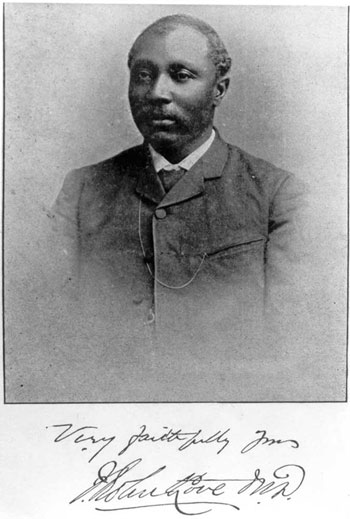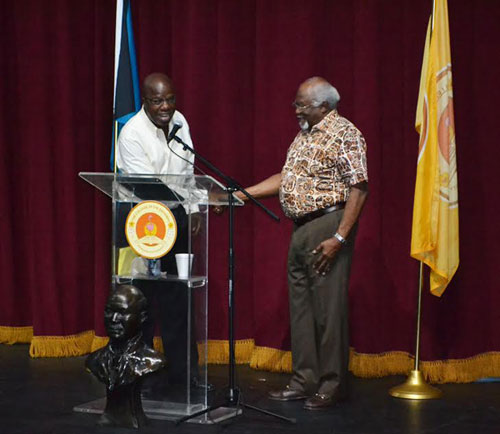|

|
 |
|
Last Updated: Feb 13, 2017 - 1:45:37 AM |

Robert Love with signature
|
REVEREND DOCTOR JOSEPH ROBERT LOVE:
Born- Grant’s Town, New Providence, Bahamas, 2nd October 1839
Died- Kingston, Jamaica, 21st November 1914
Bahamian; Jamaican; Priest; Physician; Historian; Teacher; Medical Missionary; Freemason; Author; Organiser; Newspaper Publisher/Editor; Legislator; Advocate of Pan African Unity.
The National Reparations Committee joins with the Parish Community of St. Agnes Church, Blue Hill Road, in a celebration of the life of Father Robert Love at the Evensong celebration at 6:30PM, Sunday, 22nd November. The Parish and the Community invites the wider Bahamian Community to join them in this celebration.
Please join us on Sunday evening at St. Agnes Church to begin a
celebration the life and times of a truly great son of The Bahamas, Dr.
Joseph Robert Love.
Friday, 2nd October 2015 marked the 175th Anniversary of the birth of Joseph Robert Love in Grants Town; Saturday, 21st of November 2015 is the 100th Anniversary of his death in Kingston, Jamaica.
Robert Love, as he was more popularly known, lived an incredible life and had a great impact on the United States of America, the Republic of Haiti and Jamaica as he moved from one challenge to another. We, in The Bahamas, have, before now, exhibited limited interest in the life and work of this truly great Bahamian. The Bahamas National Reparations Committee is in the process of bringing to fruition a number of projects and events designed to encourage our Community to reflect on the life and times of Reverend Doctor Joseph Robert Love.
History records that Joseph Robert Love was born in the bosom of a black community- Grant’s Town, New Providence, Bahamas- in a colonial territory of the United Kingdom just six years after British legislation declaring that all persons who lived in the empire and were considered, by British and colonial law, to be chattel property or slaves were to become ‘free’ human beings under law. All persons above the age of six were to undergo an “apprenticeship” period for between four and six years when they would be required to work for those persons who were formerly legally considered their owners. This work was to be done without remuneration except for a continuation of the food and housing provided them when they were “chattel property”. After the apprenticeship, even though promised training and support, there was general abandonment by their post enslavement employers- 100% unemployment with no education, no marketable skills, no home and no civic and social rights.
So, at Dr. Love’s birth no one would have been legally considered a slave; but, not much would be different from when they were enslaved. He grew up in a community where the conversations of adults must have included descriptions of their lives as enslaved persons and their hope for the future. They had been kidnapped, brutalised during transport from West Africa to New Providence, sold as work animals- many at Vendue House on Bay Street- and condemned to a brutalised life as property. Some were the descendants of West Africans kidnapped generations before, who had no memory of life except that of being subject to another human being who was legally their owner or master.
Dr. Love grew up in this close-knit community and was an active member of the St. Agnes Anglican Parish Church until into his twenty’s. Indications are that his desire to become a Priest was not encouraged. It is understood that this led to a decision on his part to emigrate to the United States. This would have been around the time of the American legislation ending legal slavery in the United States and coinciding with the end of their brutal Civil War. He must have felt such a sense of despair to believe that he would have a better life there; but, he did achieve so much as an immigrant in the United Sates.

A bust of Dr. Love which Mr. Andrew Wilson presented to Dr. Julius Garvey, youngest son of H.E. Marcus Mosiah Garvey following a Reparations Committee sponsored lecture by Dr. Garvey at COB November 2014.
|
Robert Love successfully completed studies at an Episcopalian Seminary and was ordained a Priest in 1876 and became Rector of St, Philip’s Episcopal Church in Buffalo, New York. He served as a Parish Priest and then, in 1877 enrolled in the Medical School at the University of Buffalo and became the first black person to graduate in 1880 from the University. He began a medical practice in conjunction with his continued service as a Priest.
Rev. Dr. Love, an admirer of the Haitian Liberator, Toussaint l’Overture, left the United States in 1881 for Haiti as a Medical Missionary. He became a confidant of General François Manigat, a military and political leader. He worked in the government’s medical and social departments. Ten years in Haiti eventually found him embroiled in political activism in support of human and political rights for immigrants. He was deported in 1891 and relocated to Jamaica.
It was in Jamaica where J. Robert Love began his final incarnation. This black man, born in a little and relatively unimportant colonial outpost, who emigrated to the United States just after its civil war and the resultant racial upheavals of the decade following, achieved a personal dream to become a Priest. Almost immediately after achieving his ambition, he began another arduous trek by studying for a medical degree and became the first black graduate in medicine from the University of Buffalo. He then, within a year of qualifying as a physician, became a medical missionary to Haiti where he worked with the needy and fought for the rights of migrants eventually running afoul of the political directorate which resulted in his deportation after ten years.
On his deportation from Haiti, he went to Jamaica where he found himself needing to fight, first for the rights of immigrants there and subsequently for political representation in the legislature by the Black population. Dr. Love founded an organisation “The Phillippo, Knibb and Burchell Memorial Fund Association” for which he campaigned throughout the island. He published his own newspaper, ‘The Jamaica Advocate’, to provide a tool for the dissemination of his views.
The Jamaica History website reports: “In June and July, 1898, Love printed in his weekly paper, the Jamaica Advocate, his lecture entitled ‘The Debt of the Negro race to the Revds, James M. Phillippo, William Knibb and Thomas Burchell.’ This lengthy lecture (it ran to two to three columns on the front page of the Advocate for six successive weeks) had first been given on August 1 1894. It was an account of the lives and work of these three clergyman, and others, who had been, in part, responsible for the Emancipation of the slaves in 1834. The Revd. Isaac Whitehouse, whom Love had apparently known in his youth in the Bahamas, was among the other clergy mentioned.”
This process brought Dr. Love to the attention of many influential Black men in towns and villages throughout the island. He encouraged them to work for Black political power. Dr. Love’s island wide effort is credited with being a “vital link in the chain of men and events which were to lead to Marcus Garvey and... to Jamaica’s political independence”
All of us, who understand the greatness of this Renaissance Man, have an obligation to work towards honouring his memory and to ‘repatriate’ him to our communal memory and consciousness. His life speaks to the universality of the African man and our common heritage, though we may be citizens of many independent states.
The National Reparations Committee will seek to accomplish a reflection on the life and work of Rev. Dr. Joseph Robert Love. We propose projects and events to include:
- Recognition, during the Evensong service at St. Agnes Church on Sunday evening, 22nd November, of the 175th Anniversary of Dr. Love’s birth and the 100th Anniversary of his death;
- Progressing a cooperative effort with the Jamaica Reparations Committee and other interested parties in Haiti, the United States, Jamaica and The Bahamas in honouring the lives and work of Dr. Love and the Hon. Marcus Mosiah Garvey;
- Bringing to an appropriate entity within the College of The Bahamas written material by Dr. Love as well as contemporary commentary on his life and work;
-
An appropriate display of a bronze bust of Dr. Love in a public area easily accessible by the populace;
-
The location of the property on which Dr. Love’s childhood home stood and the public acquisition and rehabilitation of the home-site to serve as a monument to greatness achieved. It might take the form of a museum or a library or study site to bring focus to his lifelong fight for the education and freedom of Black People;
The National Reparations Committee invites the active participation of all in this ongoing celebration. We look forward to partnering with many in our Community to reflect on and celebrate the life and work of Rev. Dr. Love and his ongoing positive impact for good.

© Copyright 2015 by thebahamasweekly.com
Top of Page
|
|
 |

|
